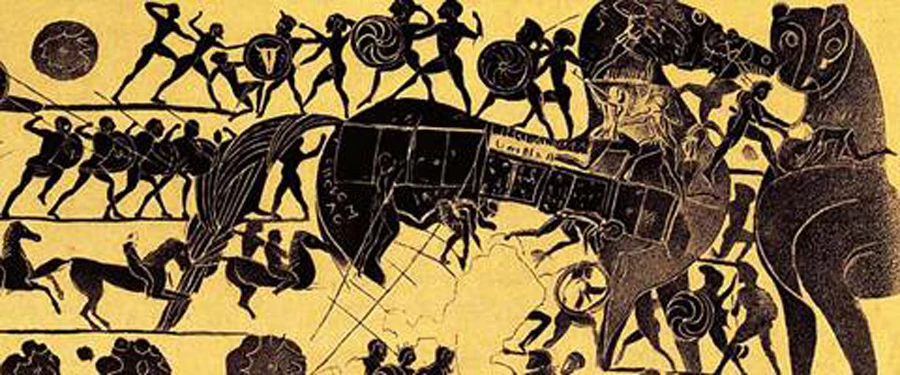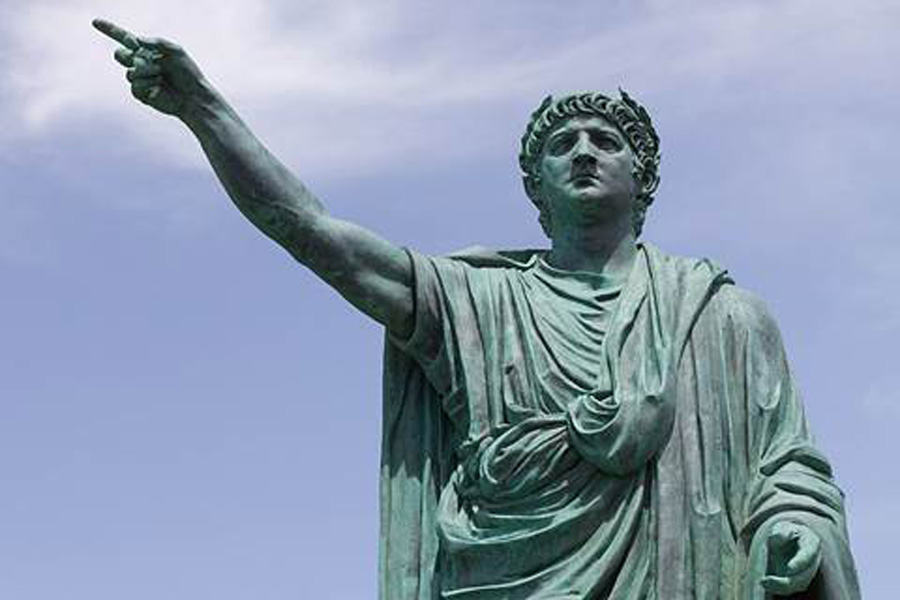The Trojan war, where the Mycenaeans destroyed the city of Troy after a ten year siege, is very well known. The stories of heroes, titanic conflicts and interfering gods has survived down the millennia, as vivid now as when it was first composed.
But it Homer’s epic is not the only telling of the events of the Trojan war. In later years the surviving account of another came to the fore, a man who claimed to have been an eye-witness to many of the events of the Iliad. Do we, in this extraordinary claim, have evidence of the first war reporter ever to exist?
Dictys of Crete, also known as Dictys Cretensis, is the name of this author. He is believed to be the legendary companion of Idomeneus, the Cretan leader from Knossos who fought for the Greeks at the siege of Troy.
According to later Byzantine scholars, Dictys of Crete was one of the leading authorities on Troy. They largely based this assumption on his authorship of a diary in which all of the events of the Trojan war were recorded. The diary was apparently recovered from his grave: Dictys chose to be buried with his work.
The text that the Byzantine scholar had was in Latin, a translation of an earlier Greek text. The Latin prologue contained details on how the text came to be preserved, claiming that it had been found by chance during the 1st century AD. The original according to this introduction was in fact in Phoenician, and was translated into Greek by the command of Nero, the Roman emperor.

During the 4th century, the text was translated by a man named Septimius, who published Dictys of Crete’s chronicles as the Ephemeris Belli Trojani. This translation became the main source for what was considered the true account of the Trojan war, to be read and understood alongside Homer.
Dictys of Crete’s Trojan War
According to Dictys of Crete, war was declared not by Mycenaean Greece seeking revenge for the kidnapping of Helen, queen of Sparta, but instead by Troy. The war was said to have lasted for 10 years, 6 months, and 12 days.
- Preserving Greek Myth: Who Were the Vatican Mythographers?
- The Mystery of the Pleiades: Where is the Seventh Sister?
The notion that in reality it was the Greeks who found themselves threatened by an aggressor seems to contradict Homer’s version of events. Dictys had the Greek responding by attacking the coastal towns present in the northwest region of Asia Minor, with Ajax, the Greek hero, attacking settlements friendly to Troy.
Ajax caused extensive damage to rich cities such as Zelea and Pitya. He also attacked Phrygia, caused general destruction, and captured the cities. Even after attacking and capturing the cities, he was not content. So, he laid waste on Gergitha, Arisba, Gargarum, Larissa, as well as Scepsis.
Troy is portrayed by Dictys as being embedded in a friendly environment with prosperous neighboring cities. The island of Lesbos was even a part of the sphere of influence of Troy, rather than being considered a Greek island like today.
Excavations have supported this, and proved that the Lesbos’s Late Bronze Age material culture corresponded to that of Troy. This would seem to be powerful support for Dictys of Crete’s narrative, as he would not have known of this link unless he had seen it himself.
Allies from as far as Ethiopia as well as India had come to help Troy. Dictys of Crete had listed down the Trojan allies in his report. He also distinguished the political allies who were contractually obliged to provide the required support to Troy.
During the Late Bronze Age, mutual aid was considered a common practice, as indicated by the documents from Ugarit, Hattusa, and Thebes. In these details he seems to paint a picture that is both more grounded than Homer’s, and demonstrably the account of a man who understood war in the Bronze Age.
A Troubled Provenance
However, there are problems with the text, and the manner in which it was preserved. Ephemeris Belli Trojani appears in the 4th century, and although we are certain that older texts did exist, the prologue and Nero’s involvement are almost certainly a later fiction.

Furthermore, it seems that in understanding the text the Byzantine scholars had got themselves into a muddle. The document could not have been a true account of the Trojan war for any number of stylistic or factual reasons.
- An Ancient Hero: Who was the Griffin Warrior of Pylos?
- The Secret Gods of the Greek Pantheon: Who Were the Cabeiri?
The events on which it is based are the first clue to the modern reader. Homer’s stories of Troy have some support in the archaeological record, but we are nowhere near as certain of the war having taken place as the Byzantines.
But this Dictys, or the source he was derived from, are certainly knowledgeable about warfare in the Bronze Age, and the events of the Iliad. Most likely the original author of the text had access to the same sources for the war as Homer, providing a great deal of insight into these sources but necessarily limited the scope of the viewpoint to differ from the Iliad.
Modern historians have a more satisfying answer for the mystery of Dictys and his writings, however. This turns out to not be some combat reportage of the Trojan war, but rather artifice designed to appear so. The journal was in fact a work of fiction, presented as such to an audience aware of the fiction.
The play was written for Alexandrians around the 3rd to 2nd century BC, presenting a narrative of the Trojan war which they understood to be, for them, a historical fiction. The fault lies in the later Byzantine scholar for mistakenly identifying the text as a real document.
But what of Dictys of Crete himself? While some believe that he was a real person, others say that he was a fictional author. However, the truth remains a mystery. There has also been a lot of debate as to whether any other of his works actually survived or not.
A number of modern scholars had even disagreed with the fact that any Greek original for his work on Troy existed. However, all their doubts were resolved when a fragment in Greek was discovered around the year 1900.
It revealed that the Latin translation was very close to the original, something which would be typically done if the original text was highly regarded. It also revealed that the text had, originally, been written in Greek, and could therefore be confirmed to be much older than if it was solely a later Latin work.
So, while the work that survives to us is a Byzantine misunderstanding of an Alexandrine fiction, the source may go back even further than the Greek of Alexandria. Was Dictys of Crete real? Maybe.
Top Image: Did Dictys of Crete really witness the Trojan war? Source: Morphart / Adobe Stock.
By Bipin Dimri